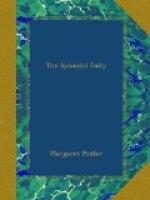Joan’s eyes travelled from Diana’s small, set face to Jerry’s pleasant boyish one. The latter had opened his mouth to speak, then thought better of it, and closed it again, reddening uncomfortably, and his dismayed expression was so obvious as to be almost comic.
The rise of the curtain for the third and last act put a summary end to any further conversation and Joan bent her attention on the stage once more, though all the time that her eyes and ears were absorbing the shifting scenes and brilliant dialogue of the play a little, persistent inner voice at the back of her brain kept repeating Diana’s nonchalant “I really don’t see very much of her nowadays,” and querying irrepressibly, “Why not?”
Meanwhile, Diana, unconscious of the uneasy curiosity she had awakened in the mind of Joan, was watching the progress of the play intently. How designedly it was written around Adrienne de Gervais—calculated to give every possible opportunity to a fine emotional actress! Her lips closed a little more tightly together as the thought took hold of her. The author must have studied Adrienne, watched her every mood, learned every twist of her temperament, to have portrayed a character so absolutely suited to her as that of Mrs. Fleming. And how could a man know a woman’s soul so well unless—unless it were the soul of the woman he loved? That was it; that was the explanation of all those things which had puzzled, and bewildered her for so long. And the author was her husband!
Diana, staring down from her box at that exquisite, breathing incarnation of grace on the stage below, felt that she hated Adrienne. She had never hated any one before, and the intensity of her feeling frightened her. Since a few months ago, strange, deep emotions had stirred within her—a passion of love and a passion of hatred such as in the days of her simple girlhood she would not have believed to be possible to any ordinary well-brought-up young Englishwoman. That Max was capable of a fierce heat of passion, she knew. But then, he was not all English; wilder blood ran in his veins. She could imagine his killing a man if driven by the lash of passionate jealousy. But she had never pictured herself obsessed by hate of a like quality.
And yet, now, as her eyes followed Adrienne’s slender figure, with its curious little air of hauteur that always set her so apart from other women, moving hither and thither on the stage, her hands clenched themselves fiercely, and her grey eyes dilated with the intensity of her hatred. Almost—almost she could understand how men and women killed each other in the grip of a jealous love. . . .
The play was ended. Adrienne had bowed repeatedly in response to the wild enthusiasm of the audience, and of a sudden a new cry mingled with the shouts and clapping.
“Author! Author!”
Adrienne came forward again and bowed, smilingly shaking her head, gesturing a negative with her hands. But still the cry went on, “Author! Author!”—the steady, persistent drone of an audience which does not mean to be denied.




